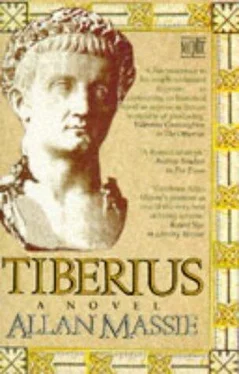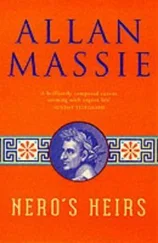Allan Massie - Tiberius
Здесь есть возможность читать онлайн «Allan Massie - Tiberius» весь текст электронной книги совершенно бесплатно (целиком полную версию без сокращений). В некоторых случаях можно слушать аудио, скачать через торрент в формате fb2 и присутствует краткое содержание. Жанр: Исторические приключения, на английском языке. Описание произведения, (предисловие) а так же отзывы посетителей доступны на портале библиотеки ЛибКат.
- Название:Tiberius
- Автор:
- Жанр:
- Год:неизвестен
- ISBN:нет данных
- Рейтинг книги:5 / 5. Голосов: 1
-
Избранное:Добавить в избранное
- Отзывы:
-
Ваша оценка:
- 100
- 1
- 2
- 3
- 4
- 5
Tiberius: краткое содержание, описание и аннотация
Предлагаем к чтению аннотацию, описание, краткое содержание или предисловие (зависит от того, что написал сам автор книги «Tiberius»). Если вы не нашли необходимую информацию о книге — напишите в комментариях, мы постараемся отыскать её.
Tiberius — читать онлайн бесплатно полную книгу (весь текст) целиком
Ниже представлен текст книги, разбитый по страницам. Система сохранения места последней прочитанной страницы, позволяет с удобством читать онлайн бесплатно книгу «Tiberius», без необходимости каждый раз заново искать на чём Вы остановились. Поставьте закладку, и сможете в любой момент перейти на страницу, на которой закончили чтение.
Интервал:
Закладка:
I kept the letter secret. There might come a time in the future when it could be of more service to me than at the present. Timotheus' manner when he delivered it to me was disturbing: I saw that.
He had outwitted me. He had made me his accomplice in deception. Nevertheless he had put a weapon in my hand. I owed that to him.
Marcellus' death robbed me of the weapon, made it obsolete. I was still, however, in the Greek's debt.
One other thing: the doctor who treated Marcellus was one Antonius Musa, the same who had cured Augustus. He had been introduced to his household by Timotheus. A few years later he retired on account of ill-health and lived in a villa with Timotheus. Their conduct scandalised the local farmers, but Augustus protected them.
It was a pleasant irony to think how Timotheus had worked to destroy the Princeps' favourite, and how Musa may well have murdered him.
6
T here are those who believe that character is constant. We become, they would insist, only what we already are; we can never escape our inherent nature. Any change that may seem to take place only reveals traits which the person has previously thought it prudent to conceal; conversely, it may result from the assumption of a hypocritical virtue. This is an argument which must perplex philosophers, and one to which there can be no certain answer. For example, Augustus showed himself ruthless in the pursuit of power; he shrank from no cruelty that seemed to him necessary for the achievement of his aims. So he sacrificed his mentor, Marcus Tullius Cice ro, at the time of the proscrip tions. Though he knew that he owed him much, he judged it more necessary to conciliate Mark Antony by bowing to the hatred Antony entertained for the veteran orator than to insist that clemency be extended to the man whom even Julius had described as "an ornament of the Republic". Likewise, Augustus loved his sister Octavia with a warmth such as he offered to few. (Had she been less ostentatiously virtuous, I have no doubt that the scandalmongers would have had much to suggest as to the nature of their relationship.) Yet he sacrificed her happiness to the demands of his alliance with Antony, forcing her to accept that brutal drunkard as her husband. Those who adhere to the opinion that character is constant must ask whether Augustus forced himself to practise a cruelty that his nature abhors or has since assumed a virtue which is no more than a manifestation of his innate hypocrisy.
For my part, I find this view of human nature false and inadequate. It seems to me that on the one hand there are depths of our character which we do not understand, which perhaps we fear, and which sometimes surface to take us by surprise; and that on the other hand, we are in a condition of perpetual creation. Heraclitus, you will remember, posed the question whether a man could ever bathe twice in the same river. His disciples assert this is impossible; everything is in a state of flux, the river is changing before our eyes. Others however, whom I will term the Common Sense school of philosophers, think this mere casuistry. They say that though the water changes the river remains; the enduring is more real than the changes which they term superficial.
It seems to me however that it is possible to grant justice to both arguments: to say that while everything changes, much that is contained in it remains the same. A man is always himself, but he is not necessarily the same man.
I am drawn into these reflections by memories of my marriage to Vipsania. I entered the marriage in obedience to my mother's wishes, understanding that her choice of my wife was politically astute. But I felt neither warmth nor enthusiasm. Moreover, in other respects, we were an awkward pair; Vipsania's chaste modesty made her as shy as my own reserve made me. Though we had known each other all our lives, we did not know how to converse. Perhaps we had never exchanged more than a few sentences over the years, and those of an insignificant sort. Now we were alone together as we had never been. Vipsania's submissiveness irritated me. She lay stiff in bed, the covers drawn up around her neck. I thought — how could I fail to? — of Julia caressing her thighs and drawing my gaze to her body. Vipsania received me as one having his will. Her sense of duty compelled her to yield to me, but as a victim, not a woman. For weeks we seemed frozen in immobility. I knew that she was unhappy and, being unhappy myself, resented her unhappiness. When I found her in tears, I was unable to take her in my arms.
I had no one to consult. The intensity of my relationship with Livia has always precluded discussion of emotional affairs. My brother Drusus, whom I loved for his spontaneity and virtue, would have been incapable of understanding my dilemma. Vipsania and I were locked in incomprehension of each other, both fearful to try to turn the key which anyway we did not perhaps recognise.
Yet now, more than twenty years later, I look back on the early days of our marriage with similar uncomprehending wonder. For everything changed. She became the medicine of my soul, the light towards which I turned. And I cannot say why or how. There was no single moment when the barriers yielded, no single moment when our personalities disarmed themselves. It was rather as if acquaintance made the ramparts crumble. Without my knowing it was happening, I was softened by her tenderness and virtue. The time came when the turn of her head, the cool touch of her flesh, her low voice, could appease any anxieties.
No doubt the birth of our son, young Drusus, contributed to this development. To see her with the baby in her arms, or leaning over his cradle lulling him to sleep with an old song, was to experience everything that over the centuries, it seems to me, men have come to desire; it was to feel myself enfolded in a love that was total.
Something else contributed to our developing intimacy: she respected my wish for secrecy. I have always felt uncomfortable with the expression of emotion, either by words or actions. She did not try to force my confidence, and in this way gradually won it.
Meanwhile Julia presented a problem. She believed she had a claim on me. She knew she could arouse me, and for that reason regarded me as her possession. My marriage meant nothing to her. "It's convenience, isn't it?" she would say; then, looking at me through her veil of eyelashes and touching her breast or stroking her thighs, "Of course, if you are going to take it seriously, it's an inconvenience. But only a trifling one. You couldn't prefer that insipid girl to me, could you?"
Put like that, she was quite right. Her body was to me as the wine-flask to the drunkard: a temptation that made me tremble. Half a dozen times, in the winter that followed Marcellus' death, I slipped into her bed, knew the intensity of delight, and then the pain of remorse and self-contempt. I have never been able to regard the sexual act as something from which emotion can be divorced.
Livia knew what was happening and reproached me. "You are weak," she said, "contemptibly weak. Do you want to destroy everything I had worked for on your behalf?" There was no answer to that. Shame locked my tongue. "Do you know," she said, "Augustus suggested to me that you should marry her? I soon put a stop to that. Besides, he must be mad to think of it, I said. How could he contemplate so offending Agrippa, by dishonouring his daughter? And now, you fool, you are risking just that. And for what? For a little honeypot that needs her bottom smacked."
At that time Julia's behaviour stopped just short of being scandalous. All the same the spy Timotheus approached me, having, as he said, my best interests at heart. I wasn't Julia's only lover; she was the centre of a coterie of young nobles, some of whom, he said, had "dangerous antecedents". I would do well to be careful.
Читать дальшеИнтервал:
Закладка:
Похожие книги на «Tiberius»
Представляем Вашему вниманию похожие книги на «Tiberius» списком для выбора. Мы отобрали схожую по названию и смыслу литературу в надежде предоставить читателям больше вариантов отыскать новые, интересные, ещё непрочитанные произведения.
Обсуждение, отзывы о книге «Tiberius» и просто собственные мнения читателей. Оставьте ваши комментарии, напишите, что Вы думаете о произведении, его смысле или главных героях. Укажите что конкретно понравилось, а что нет, и почему Вы так считаете.












